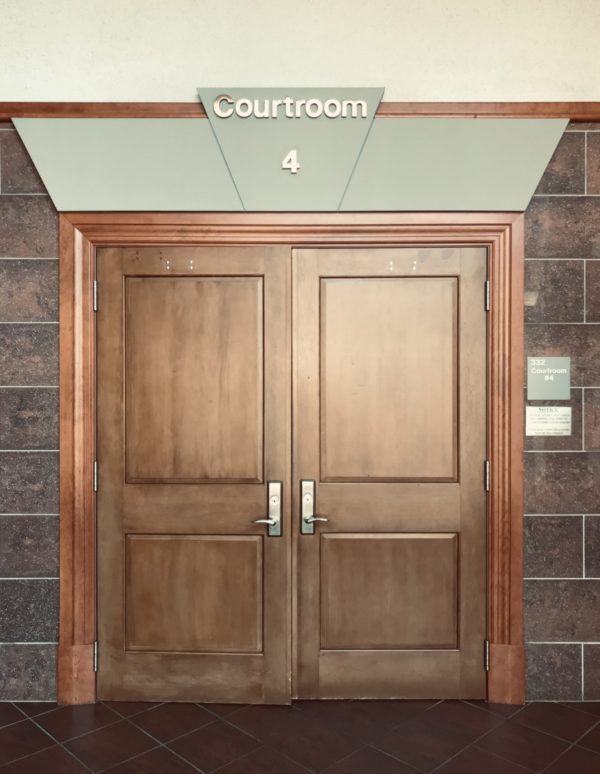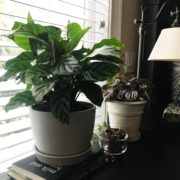the hearing

When the man in baggy orange prison scrubs and handcuffs shuffled into the hearing room, I looked down at my hands in my lap. I took a deep breath and focused on stopping my handwringing, on staying calm. The bailiff seated him on the opposite side of the table from me and then returned to his position to the left of the judge, seated at the far end of the T-shaped table arrangement. I sensed the prisoner’s eyes on me, but I could not look at him. I felt nauseated just being in the room with him, and I didn’t want him looking at me. My attorney, seated to my right, reached her hand under the table and patted my leg, offering this small measure of comfort. It helped, knowing she was beside me and had this all under control.
The prisoner, in his mid-50s, was disheveled, with a long, thin face framed by shoulder-length brown hair that looked as if it had not been washed in a week. It probably hadn’t, as he’d been in jail since his arrest one week earlier for violating the temporary injunction order that prohibited him from any contact with my mother. This man was one of the two men who moved onto my mom’s property shortly after my grandmother died in March 2018. The second man would be brought into the hearing room soon, once this first part was over.
We were sworn in, and the judge began the hearing. She read the details of the injunction to him – a final injunction for protection against exploitation of a vulnerable adult. He mumbled his consent to it and an apology, but I continued to look only at the judge or her clerk. The clerk occasionally looked my way, and I believed I saw compassion in her eyes. When the judge stopped talking and paused to sign three copies of the injunction order, the man spoke again, clearly directed at me this time, not just to the judge.
He told me he was sorry, and he said it several more times, in slightly different ways. I ignored him. He was speaking, these apologies coming out of his mouth, but I did not look his way. I could not look at his face. I pretended he wasn’t speaking, wasn’t even in the room. My heart raced and my breathing quickened. He continued to apologize as the bailiff led him out of the room. When the door shut behind them, I let out a sob and covered my face with my hands. I will not forget the judge getting out of her seat and walking to the adjacent bathroom I had not known was there to grab some paper towels. I won’t forget her kind smile as she handed them to me.
One down.
The second man, B, was soon escorted into the hearing room, taking the prisoner’s place across the table from me. For this hearing, though, my mother wanted to be present. As the victim – the vulnerable adult – she was allowed to there, but the complicating factor was that she liked this man. He was her friend. He took her places and had the only vehicle on the property. He took her out for lunch and for drinks. She wanted him to stay.
My mother and I had spent at least five minutes awkwardly chatting in the courtroom gallery before my attorney and I were called back for the first hearing. She had stood unsteadily, using her wheeled walker for support. I tried not to notice how skeletal and frail she looked. I didn’t realize it at the time, but my mother had not recognized me then. However, It became quite clear when, once everyone was seated, the judge spoke to me, confusing my mother. My mother leaned forward, looked around my attorney so she could see me, and said, “Oh! I haven’t seen you in such a long time.” She was surprised I was there. It was clear to me that the judge took note of this fact.
This small but significant event sat heavily in my stomach, as if I’d swallowed rocks.
The hearing proceeded, and surprisingly, B consented to the final injunction. I don’t know what his body language conveyed, nor could I describe how he looked that day with any accuracy. I didn’t look at him the entire time. I just could not. The thought of looking at him, of making eye contact, made me feel ill.
My mother protested, at the end. She explained to the judge that B was her friend. He was a good man, and she loved him. She demanded to know what the evidence was against him. The judge was kind with her, but firm. The judge told my mother that she’d read somewhere around 140 pages of evidence against him, give or take. The court’s decision was made, she explained. The judge signed the final order of injunction against this man, B, protecting my mother against further exploitation. He was allowed one final visit to her property, with law enforcement, to remove his belongings. No other contact was allowed.
Afterward, I sat in my car, reflecting on all that had happened that morning in court, and in the 20 months or so since those two men entered her life, and thus ours. My mother’s bank account was drained on a monthly basis. The prisoner, before he was arrested, ate all of her food so B kept her food in his area. But when B wasn’t around, my mom was not able to eat, and so she didn’t. They stole copper wiring from her house. They wired into her electricity, stealing the electricity to power the flat-screen television and the hot tub they purchased with her money. Her electric bill doubled, and we struggled to pay it for her before they stole all of her money in the first ten days of each month, when her social security and pension checks would hit her bank account. They stole from her house – paintings, her television, speakers, anything and everything of value – and from my father’s stained-glass studio. They scared off the home health aide we’d arranged through Elder Options.
I was used to receiving regular calls from various well-meaning sheriff’s deputies who’d been called to her property due to a disturbance or a request for a well-check. I was used to receiving messages or texts from her former friends or concerned locals, always wondering why I wasn’t doing more to help her. I always expected a call from an emergency room physician, or from a coroner.
Why didn’t I do more? The answer was always simple. I tried. She refused. She chose her exploiter, every time. Alcoholism is ultimately to blame, but she also made choices along the way. I know this to be true.
I took a few deep breaths, hands on the steering wheel, staring out into the courthouse parking lot. My nausea was receding, but my heart rate had not yet returned to normal. My husband had left the parking lot a few minutes earlier with my angry and sullen mother, to take her back to her house, now man-less. She would tell me a few days later, the day after Christmas, in front of my children, that I’d broken her heart by making B leave.
I put my car in reverse, left the courthouse parking lot, and headed home. I had some Christmas cookies to bake with my children.









What a heartbreaking ordeal. It had to be bittersweet writing this post. Thanks for sharing and as always I’m impressed with your capacity to do what you do with grace and strength. Hugs and prayers.
There, but for the grace of god, go any of us. I’m hopeful for you and your family, that this is behind you for good. I’m sure I’m not the only one who has missed your posts.
How horrible. I’m so sorry this is what you are going through. It’s a difficult season of life to be between still caring for children and having parents that don’t make good decisions and all the terrible repercussions from these bad decisions.